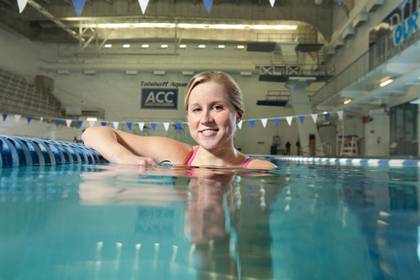Implanted Defibrillator is “No Big Deal” for MSN Student

Carolina 'Callie' Dimsdale, MSN-current, a nurse in Duke Hospital's Cardiac Intensive Care Unit, knows first-hand the anxiety and fear that comes with being diagnosed with a life threatening heart condition.
Sometimes, if her patients are stressed about receiving a pacemaker or other implanted cardiac device, she'll pull aside the collar of her shirt and reveal a 3-inch long scar just below her left collarbone. She'll tap lightly on a nearly undetectable rectangular bump beneath the skin, pointing to where an implantable cardioverter defibrillator (ICD) was placed seven years ago.
"It changed my life," she tells them. "This is not a death sentence, and you don't have to lay on the couch for the rest of your life."
Indeed.
Since receiving her ICD, Dimsdale, 25, has run two marathons (qualifying for Boston in her first), completed a half-Ironman Triathlon (1 mile swim, 75 mile bike, 13.1 mile run), and has returned to competitive swimming on a local master's team where last year she clocked a personal best time of 24.4 seconds in the 50-meter freestyle.
This summer she was an ambassador for the Medtronic Foundation at the Twin Cities Marathon in Minneapolis. Medtronic makes pacemakers and ICDs, insulin pumps, brain stimulators and other medical devices. Dimsdale was chosen to run the marathon along with 24 other patient-athletes as a testament that runners with such implants can live full, normal lives.
"It's rare that I tell my patients my story because I would never want to undermine what they are going through," she says. "But if there is someone who can really use some encouragement, then hopefully it makes a difference."
Dimsdale's own emotional journey began when she was 16. She had been swimming competitively for a decade and was so good she competed in the U.S. Junior National Championships, with an eye toward eventually going to the Olympics.
When she passed out several times in high school she assumed it was from dehydration because she was so physically active. The truth, however, was far worse. She was diagnosed with Long QT Syndrome, a rare heart condition that can cause palpitations, arrhythmia and sudden death. Her doctor forbade her from swimming for the rest of the summer.
"That was devastating," she says.
She later was allowed to return to swimming so long as she kept a clunky portable defibrillator by the pool. It was embarrassing, she says, so she wasn't always compliant. Luckily, she never required its use. Dimsdale continued to excel in the water and was recruited by NCAA Division I school East Carolina University (ECU), where, at 18, she matriculated into the Bachelor of Science in Nursing Program.
"I made sure they were aware of my condition and I started training with them right away," she says.
But after her physical, the team doctor said he would not allow her on the team because she was too much of a liability.
"It was probably the worst point in my life," she says. "I was so excited to swim at the collegiate level. I wondered who else would think of me as a liability?"
One night in her dorm a short while later, she had severe chest pains. She rushed to student health services for an EKG. Based on that information her doctor told her she had to either stop intense exercise and competition or get an ICD.
"I said inactivity is just not an option, so, ICD please!" Dimsdale says.
The battery-powered device is slightly smaller than the thinnest cell phone. It is programmed to detect cardiac arrhythmia and correct it by delivering a charge of electricity -- mild for slight arrhythmia or a full shock if a lethal arrhythmia is detected.
"I can feel the soft pacing charges but I've never had to be defibrillated," she says.
Every three months, "I download myself," she says, wirelessly transferring data collected by the ICD to a small computer that sends it to her doctor. This technology lets Dimsdale know the exact days and times when the ICD was needed so she can assess what stressors led to its use.
"If nothing else, the information reaffirms that I benefit from this medical therapy," she says.
Dimsdale will complete the Duke University School of Nursing's Acute Care Nurse Practitioner Master's Program this year. She plans to continue working with cardiology patients in a hospital setting.
"I like that the hospital runs 24/7 and never slows down," she says. "When you walk into the ICU it's a hub of excitement. There's always an opportunity to teach and encourage patients. Caring for cardiac patients is easy for me because I feel a kind of camaraderie and empathy for them."
And she'll continue to share her story whenever appropriate.
"It's one thing to tell a patient, 'This procedure is not a big deal. It only takes 30 minutes to put in an ICD.' But it's another thing to show them my scar and assure them they can continue to do the things they love, and be safe doing them."
Dimsdale's mother, Allison, is a cardiac nurse practitioner at Duke Hospital; her younger sister Hannah graduates from ECU in May with a nursing degree; her father Todd, a former collegiate swimmer, works at GlaxoSmithKline. Dimsdale is originally from Mississippi. The name Carolina is a family name.